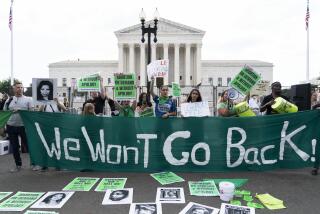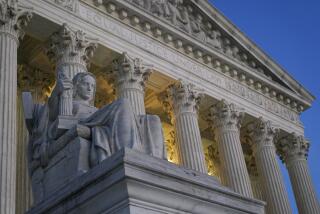Supreme Court issues a go-slow signal in its first abortion decision of the year
The Supreme Court handed down its first abortion decision of the year on Tuesday, with a mixed result that clearly signaled the conservative majority is not ready to reconsider the right to abortion set in Roe vs. Wade.
By a 7-2 vote, the justices upheld an unusual provision of an Indiana law that requires clinics to bury or cremate the remains of a fetus. This mostly symbolic rule does not violate a woman’s right to choose abortion or put an “undue burden” on those who do so, the justices said in a brief, unsigned opinion.
At the same time, the court, without a dissent, rejected the state’s effort to revive a significant restriction on abortion. The justices left in place lower court rulings that blocked an Indiana law that would make it illegal for women to end a pregnancy because of the race or gender of the fetus or if they received a diagnosis of Down syndrome.
Since Justice Brett M. Kavanaugh won confirmation, social conservatives have hoped -- and many liberals have feared — that the high court with two appointees of President Trump would move to overturn the 1973 Roe decision, or at least significantly limit abortion rights. With their eyes on that possibility, Republican lawmakers in at least a half-dozen conservative states have enacted abortion bans this year.
But Tuesday’s outcome, after weeks of internal debate, suggests that the justices are inclined to move slowly and cautiously on the abortion issue and that Chief Justice John G. Roberts Jr. and his fellow conservatives are not ready to directly confront abortion rights, at least during a presidential election year. Had the high court agreed to hear the Indiana case, it would have been argued in the fall and decided by June 2020.
The decision not to hear Indiana’s appeal provides further evidence that the justices will not be eager to consider the even more sweeping abortion bans recently adopted by Alabama and other conservative states.
The spotlight has been on Kavanaugh. He replaced Justice Anthony M. Kennedy, who had joined with the court’s liberals, starting in 1992, to uphold the right to abortion. Neither Kavanaugh nor Justice Neil M. Gorsuch wrote separately on Tuesday in favor of hearing the Indiana case.
Social conservatives suffered a second setback on Tuesday, on another controversial issue — the treatment of transgender individuals. The justices refused to hear a right-to-privacy challenge to the decision by a Pennsylvania school district that allowed a transgender student to use the boys’ locker room. Lawyers for the Alliance Defending Freedom sued on behalf of a high school boy who said he “felt embarrassed” about possibly seeing the other student in his underwear.
Two lower courts rejected the suit, and the justices said they would not hear the case of Doe vs. Boyertown Area School District. Asaf Orr, an attorney for the Transgender Youth Project, called the court’s action “a major victory for transgender youth and their families.”
“The vast majority of people in this country support equal treatment of all students, including those who are transgender,” Orr said.
Since early January, the justices had debated Indiana’s appeal in Box vs. Planned Parenthood during their weekly conferences. Only four justices would have needed to vote to grant review of Indiana’s appeal for the court to hear arguments on it. Instead, the justices denied the state’s case with no registered dissents.
At the same time, the justices voted 7-2 to uphold the fetal-remains part of Indiana’s law, an issue they had not previously ruled on. Justices Ruth Bader Ginsburg and Sonia Sotomayor dissented.
In upholding that portion of the law, the justices in the majority said that states can legitimately regulate the burial of fetal remains. But they noted that their ruling did not alter previous decisions on whether state efforts to limit abortion itself amount to an “undue burden” on a woman’s right to choose to end a pregnancy.
The fetal-remains law “does not implicate our cases applying the undue burden test to abortion regulations,” they wrote.
Lower courts had struck down Indiana’s law as unconstitutional under Roe vs. Wade. Under that decision, a woman and her doctor, not the state, have the right to choose whether to end an early or midterm pregnancy.
The Indiana law, adopted in 2016 and signed by then-Gov. Mike Pence, sought to prohibit abortions entirely in some situations.
Its “non-discrimination” provision said “Indiana does not allow a fetus to be aborted solely because of the fetus’s race, color, national origin, ancestry, sex, or diagnosis or potential diagnosis of the fetus having Down syndrome or any other disability.”
The law had a narrow exemption for a lethal condition that “will with reasonable certainty result in the death of the child not more than three months after the child’s birth.”
A federal judge in Indiana and the U.S. 7th Circuit Court of Appeals in Chicago blocked the entire law from taking effect and ruled it was unconstitutional, saying that the “nondiscrimination” provision violated Roe vs. Wade and that the fetal-remains part of the law had no legitimate purpose.
Last year, the 7th Circuit split 4-4 on whether to reconsider that ruling. The dissenters included Judges Amy Coney Barrett from Indiana and Diane Sykes from Wisconsin, both of whom were considered by Trump for a Supreme Court nomination.
Indiana appealed to the Supreme Court in October, a week after Kavanaugh was sworn in.
In siding with the the lower courts on the main part of the law, the justices wrote that the decision not to hear Indiana’s appeal “expresses no view on the merits” of the issue, “whether Indiana may prohibit the knowing provision of sex-, race- and disability-selective abortions by abortion providers.”
That issue has so far only been considered by one appellate court, the 7th Circuit, and the justices said they would wait until other appeals courts have looked at similar laws before jumping in to consider it.
Justice Clarence Thomas, writing for himself, said in a 20-page opinion that the court “will soon need to confront the constitutionality of laws like Indiana’s” because of “the potential for abortion to become a tool of eugenic manipulation.”
“From the beginning, birth control and abortion were promoted as a means of effectuating eugenics,” he wrote, in an unusual, lengthy attack on early supporters of women’s access to contraception and abortion.
ACLU lawyers who had sued to block the Indiana law called the outcome a “mixed ruling.”
The high court “let another unwarranted restriction on abortion stand. While the ruling is limited, the law is part of a larger trend of state laws designed to stigmatize and drive abortion care of out of reach,” said Jennifer Dalven, director of the ACLU’s Reproductive Freedom Project.
An antiabortion group, Students for Life of America, said the court got it “half-right” in the Indiana case.
“The justices got it right that aborted infants need to be buried and cremated respectfully as they are human beings, not trash,” said Kristan Hawkins, the group’s president.
Carol Tobias, president of the National Right to Life Committee, said her group “applauds Justice Thomas for using this opportunity to expose Planned Parenthood’s eugenic legacy and for highlighting the need to protect unborn children from being exterminated based on their race, sex or level of disability.”
The justices are still likely to consider some aspects of abortion law in the months ahead. This month, the court has been considering another appeal from Indiana. This one seeks to revive a regulation that would require women to undergo an ultrasound test and then wait at least 18 hours before having an abortion.
The 7th Circuit blocked that law on the grounds it would put an undue burden on low-income women who had to travel hours to reach an abortion facility and stay there for two days.
The justices are likely to take up a Louisiana law that would require abortion facilities to have a doctor on their staff who has admitting privileges at a nearby hospital. In February, the court, with Chief Justice Roberts in the majority, issued a 5-4 order to block that law from taking effect while the high court weighs an appeal.
The justices seem likely not to grant review of that case, June Medical Services vs. Gee, until the fall. That, in turn, means a decision would probably not come before June 2020.
Twitter: DavidGSavage
More to Read
Get the L.A. Times Politics newsletter
Deeply reported insights into legislation, politics and policy from Sacramento, Washington and beyond. In your inbox three times per week.
You may occasionally receive promotional content from the Los Angeles Times.







